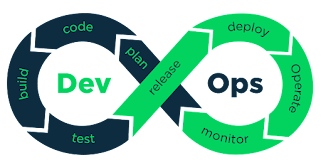What Is The Goal Of A DevOps Methodology?
DevOps is a collection of
technologies, processes, and cultural ideas for automating and
incorporating software development and IT teams. Team empowerment,
cross-team communication and collaboration, and technology automation are all
highlighted.
Because of the fast-paced evolution of the IT sector and continual technical advancements, firms must set DevOps goals that are both practical and challenging in order to compete and succeed in the market.
DevOps Methodology
DevOps is a development technique in which Development and IT Operations collaborate throughout the lifecycle to accelerate the deployment of dedicated software products.
- A good approach ensures that code moves seamlessly through each stage of the lifecycle without data becoming stranded in silos. It should specify what is expected of everyone participating in each step, as well as what is required to advance to the next stage.
- Implementing a suitable DevOps methodology is a significant investment.
The Basics Of The
DevOps Methodology
Developers and IT operations work
together on a DevOps team to increase the quality and speed of software
deployment across the product lifecycle. It's a distinct way of working, a
cultural revolution, with significant ramifications for teams and the
businesses for which they work.
Let's get started by learning about
the stages of the lifecycle and how the DevOps methodology can help:
- Development - DevOps incorporates feedback from operations, resulting in code that is more maintainable and robust.
- Testing - Your methodology enables you to test automatically throughout the project's lifecycle, keeping it moving without the need for manual intervention.
- Integration - DevOps reduces integration roadblocks, allowing you to integrate continuously with minimal effort.
- Monitoring - Monitoring tools are used in the DevOps methodology to monitor data in order to inform development throughout the complete lifecycle.
- Feedback - Your DevOps methodology's periodic deployments provide a limitless amount of opportunity for feedback to improve your project.
- Deployment - DevOps makes regular, modest deployments with minimal manual intervention using techniques like container orchestration.
- Operations - DevOps ensures that code is maintained once it has been deployed, even if there are unavoidable incidents. When things go wrong, it assures you learn everything you can.
DevOps Methodology Goals
A DevOps methodology is a set of processes and methods for achieving DevOps' benefits. Teams who adopt the DevOps culture, tools, and processes become high-performing, producing better products faster and with more customer satisfaction. Improving teamwork and productivity is also critical to meet business objectives.
- Ensures effective collaboration between teams
Shared ownership is essential for effective collaboration in any activity. Everyone involved should remember that they are all equally responsible for the development process. Each team member should be equally active in all aspects of the project, whether it be testing, development, or deployment. They should understand that their stake in the outcome is equal. This speed up the entire development process as facilitating collaboration amongst all of the teams is involved.
- Builds on-demand release capabilities
Companies must focus on maintaining a releasable state for their software. The software will be able to count new features and go live at any time with continuous delivery. Because it has so many benefits, DevOps strives to automate the release management process. Automated release management is quick, consistent, and repeatable. Furthermore, corporations can automate the release of new versions based on their requirements. Automated release management also includes full and thorough audit trials, which are critical for meeting compliance goals.
- Provides faster feedback
Automating time-consuming tasks like testing and reporting will improve the process of receiving instant feedback. Because the development team will know what has to be changed, the revised version will be released more quickly. Furthermore, the team has a reasonable understanding of the impact of the modifications it has made to the software lifecycle. The developers and operations team can make more profitable decisions as a group and improve the app's performance if they receive timely feedback.
Explore more on: DevOps Certification


Comments
Post a Comment